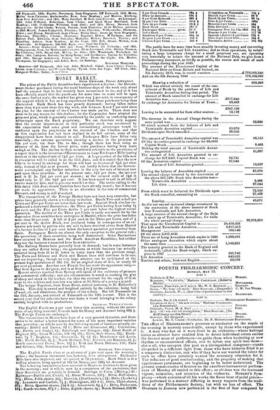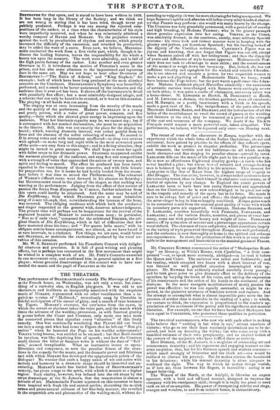FOURTH PHILHARMONIC CONCERT.
MONDAY, MAY 13.
PART t.
Sinfonia in E flat Mower.
Romance, " Va dit elle," Madame CASTELLAN, (Robert le .Diable) MEYERBEER. Concerto, Pianoforte, in C minor. Mr. W. S. Bzwurrr BENNETT.
Scrua, " Wo berg' ich inich," Herr STMIDIOL, (Euryanthe) C. M. Vox WEBER. Overture. Leonora. No.1, (first time of performance in this country) BEETHOVEN.
PART
Sinfunia, No. 3, (A minor) MENDELSSOHN BARTHOLDY. Cavatina ml Aria. " Ab non credea," Madame Casvaidadv, (La Sonnambrda) RELIANT. Concerto, Violin, M. A. Purr Purr.
Aria, "01 wie sill kb triumphiren," Herr STAVE/MI, (Die Entfahrung ass dem Serail) MOZART. Ot ertui e, Der Berggeist STORK. Leader, Mr. T. cootie—Conductor, Dr. F. MENDELSBOHN Bearnoure, THE effect of MENDELSSOHN'S presence as conductor on the music of the evening is scarcely conceivable, except by those who experienced it. A man who has as it were lived in an orchestra—whose habitual duties as director bare enabled him to detect individual errors amidst the densest mass of performers—to guide them when hesitating at new rhythm or unaccustomed effects, and to infuse one spirit into them— above all, who occupies this post as a distinguished composer—stands altogether in a different light from those who have hitherto filled it as a temporary distinction, and who if they have not wanted the talent for such an office have certainly wanted the necessary education for it. The influence of good conductorship, and the propriety of making that appointment permanent, are beginning to be better understood. The general commentaries of hearers on the excellent instrumental perform- ance of Monday all tended to this effect ; so obvious was the increased vigour, animation, and attention of the orchestra. MOZART'S Sym- phony—which contains of all his works the finest feast of pedal points— was performed in a manner differing in many respects from the tradi- tions of the Philharmonic Society, but with no loss of effect,. The Overture to Leonora now performed is the first of four composed by
Barrnoven for that opera, and is stated to have been written in 1805. It has been long in the library of the Society ; and we think we are not wrong in stating that it has been tried, though never yet publicly produced. Perhaps it was one among the rejected com- positions of the author, at a time when the characteristics of his style were imperfectly mastered, and when he was reluctantly admitted a worthy compeer of HAYDN and MOZART. To the prejudice created against the work by peculiarities of rhythm and accent, which greatly increased the difficulty of the execution, and retarded its production, may be added the want of a score. Even now, we believe, MENDELS- going conducted the work from a first violin part, which, though it in- dicates the leading features, leaves the responsibility for the whole a heavy tax upon the memory. The work went admirably, and is full of the high poetic fantasy of the author. Like another and even greater Overture in C, it introduces the motivo of Florestan's scene in the prison, and has also some allusions to the impassioned and rapturous duet in the same act. May we not hope to hear other Overtures of BEETHOVEN ?—" The Ruins of Athens," and "King Stephen," for example ; both of which have been long produced at the most classical concerts on the Continent. MENDELSSOHN'S Symphony was beautifully performed, and seemed to be better understood by the orchestra and the audience than it ever yet has been. It shows off the instruments in detail with peculiarly fine effect ; has a most admirably-designed adagio, and a scherzo that can only be heard to be encored, as it was on this occasion. The playing en all hands was con anwre.
The singing was at once interesting from the novelty of the music and the quality of the performers. Madame CASTELLAN is a young and pretty person, with a voice of great power, compass, and fine quality,—facts which she showed great energy in impressing upon the audience. What her histrionic capacity may be, we cannot say ; but if it correspond with her musical declamation, she must be an acquisition to the theatre. Still, this was not exactly the place for the display we beard ; which, wanting dramatic interest, was rather painful from its force and the absence of the softer colouring of music. To ascend to .0 in strong notes and with intonation unaffected—to drop two octaves with aplomb—to make long and rapid trills in the most unwonted parts of the scale—are easy feats to this singer ; and in a fitting situation, they might be turned to great account. We shall hope to meet her again with fuller scope to her dramatic power. STAUDIGL reappeared amidst the warmest greetings of the audience, and sang fine new compositions with a strength of voice that approached the unison of twenty men, and spirit and feeling to match. The effect he produced has been rarely equalled in the vocal history of these concerts ; and with little leisure for preparation too, for it seems he had hardly landed from the steam- boat before it was time to attend the Philharmonic. The rehearsal of WEBER'S difficult scena went forward in his absence on Saturday ; but MENDELSSOHN stood in the place of the singer, so that nothing was wanting at the performance. Judging from the effect of that torrent of passion the Scena from Euryanthe in C minor, further selections from this opera could hardly be misplaced. And the same may be said of Die Entfiihrung ; from which Sr/armor.. gave a most inimitable song of comic triamph, that, notwithstanding the lateness of the hour, was encored. The obliging readiness with which both the conductor and singer responded to the general wish, deserves acknowledgment. The present time will perhaps not be inopportune for the revival of the neglected beauties of MOZART in concert-room song ; in particular, "Non so d' onde vieni," composed for the celebrated FISCHER, the ori- ginal Osmin of Die Entfiihrung, which is fall of difficulties that few have mastered since his time ; and " Per questa bella mano," with its obligati) contra-basso accompaniment, not altered, as we have heard it at rare intervals, to a clarionet. Few things, we are sure, would better suit STAUDIGL, or maintain the excitement produced by the vocal no- velties of this occasion.
Mr. W. S. BENNLTT performed his Pianoforte Concert with delight- ful clearness and precision. It is full of good writing and pleasing effects, but is perhaps less connected in the first movement than might be wished in a complete work of art. Mr. Porr's Concerto extended to one movement only, and confirmed him in general opinion as a fine player ; whose greatest disadvantage at this concert was to have suc- ceeded the music and the pupil of PAGANINI at the last.



























 Previous page
Previous page